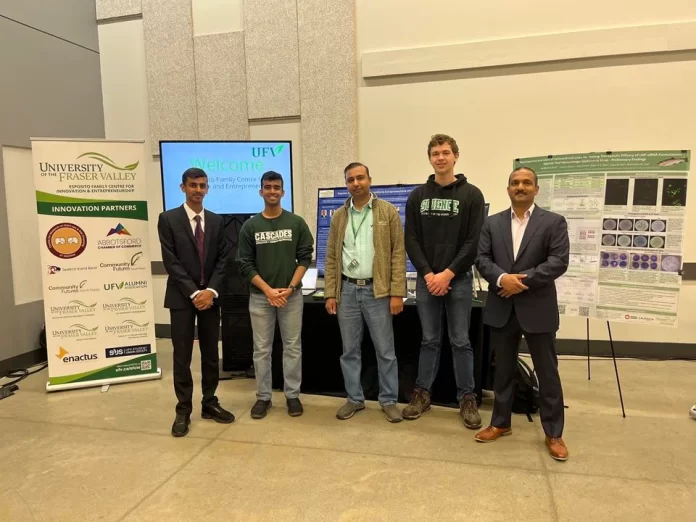Dr. Jon Thomas is the director of the Esposito Family Centre for Innovation & Entrepreneurship (EFCIE) at UFV and holds the BC Regional Innovation Chair on Canada-India Partnership Development. As associate professor of innovation & entrepreneurship, he specializes in fostering interdisciplinary research and entrepreneurial initiatives.
Recently, Dr. Jon Thomas shared insights with The Cascade about the $23 million in funding that UFV will receive from the invention to Innovation (i2l) network. This initiative supports both undergraduate and graduate students, as well as researchers at Canadian universities, primarily in science, technology, engineering, and mathematics (STEM) disciplines.
The i2I program began in 2015 and is partly based on research conducted by Dr. Thomas and his colleagues at Simon Fraser University. The program supports scientists and engineers in developing technologies within academic labs and involves guiding them toward one of three pathways: translational researchers who later become professors and set up their labs, launching startups, or licensing their innovations to established companies.
The Natural Sciences and Engineering Research Council (NSERC) of Canada Lab to Market grant is worth $23 million. This is a five-year funding initiative that supports a nationwide partnership involving 13 universities across Canada and over 57 collaborating organizations. This grant is allocated to the entire network, with a portion directed to UFV.
The amount for the first year is around $200,000, and will be used to organize workshops for Indigenous entrepreneurs and leadership teams. It will also fund training for UFV undergraduate students in science, technology, and innovation ideas.
UFV received preliminary funding through the letter of intent process to support the larger grant. In July 2024, the funding facilitated a grant workshop focusing on ways to engage with the community — in partnership with Stó:l? Community Futures and led by Rocio Zielinski — for elders and economic development officers from local First Nations communities.
The workshop helped the team realize that diverse Indigenous communities have different abilities to participate in training programs, with some requiring more support than others.
There is also a need to encourage participation, and UFV is working on identifying community innovation ambassadors — local representatives who can help pinpoint individuals needing training.
Dr. Thomas shared his plans to offer one to two workshops for First Nations communities annually, with the following sessions expected this year. Training programs for undergraduate students, focusing on science, technology, and innovation, are anticipated to begin later in the year.
The i2I network emphasizes the importance of identifying community needs before developing solutions. Often, researchers create technology first and then search for a problem to apply it to.
“A better way to do it is to understand what buyers need and then spend time in your lab to develop something that can solve their problem.”
The i2I network will extend its support to student researchers through the grant, allowing them to experiment with new ideas. Additionally, the network connects students with industry professionals for guidance and offers one-on-one mentoring to students who are developing their business ideas.
In the past, UFV supported local initiatives by contributing $5,000 to an entrepreneurship competition run by Community Futures in the Fraser Valley.
According to Dr. Thomas, the funding is expected to impact UFV and the Fraser Valley significantly. Students at UFV will also receive training on identifying the market’s unmet needs and taking their ideas to potential industries who can help develop them for customers.
“If you have an idea which needs industry-specific scale-up expertise in a particular domain … we can facilitate that because of the connectivity with this larger network.”
The grant strongly emphasizes equity, diversity, and inclusion (EDI) as well as reconciliation. Over the five-year period, multiple workshops for Indigenous entrepreneurs and students will not only benefit the UFV community, but will also attract participation from partner universities such as UNBC and the University of Manitoba.
“They will be following the lead of UFV and what we do here to design specific programs back at their own institutions.”
Dr. Thomas advised students and entrepreneurs hoping to work with EFCIE to take full advantage of the early stage they are in. He encourages students to reach out to him as soon as possible, so he can help them begin mapping out projects and connect them with mentors or industry professionals for extra support.
Dr. Thomas emphasized gaining industry experience before pursuing entrepreneurship. He advised students to gain at least one to two years of proficiency to understand its intricacies and nuances. He believes that it’ll help prepare them for success when they launch their start-ups.
In the long run, Dr. Thomas envisions the network will expand connections with First Nations communities and undergraduate students. Additionally, it will refine and support student ideas through mentorship, funding, and resources, with the hope that these ideas will either be licensed to established companies or lead to new ventures created by students themselves.



